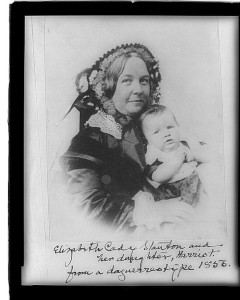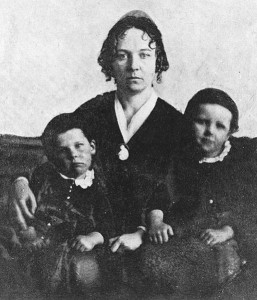From a Seneca County, New York newspaper in 1863:
A Call for Loyal Women.
Mrs. ELIZABETH CADY STANTON, familiarly known to the citizens of our village, is out with a call for a meeting of the “loyal women of the nation,” to be held in New York, on Thursday, May 14th. The call is published in the Tribune, and appeals most impassionately to strong-minded women, whose husbands are Abolitionists, to come out and assist in reviving the slumbering patriotism of the home circle. This is the last call to the chivalrous Wide Awakes of the North, who do not volunteer to fight the rebels for the abolition of slavery. The Abolition women are determined to shame the Abolition men into acton, hence the stirring appeal of Sister STANTON. We indulge in the liveliest hopes that this movement will result in great good, and that Mrs. STANTON’s able-bodied husband, and sons, who are now drawing large salaries as attachees of the New York Custom House, may be induced to volunteer, and that, too, without delay.
Elizabeth Cady Stanton was “familiarly known” to the people of Seneca Falls, New York because she lived there for a time and “Her Declaration of Sentiments, presented at the first women’s rights convention held in 1848 in Seneca Falls, New York, is often credited with initiating the first organized women’s rights and women’s suffrage movements in the United States.”
The Woman’s National Loyal League was indeed formed in New York City on May 14, 1863 “to organize support for an amendment to the U.S. Constitution that would abolish slavery.” Susan B. Anthony was Elizabeth Cady Stanton’s co-founder of the organizational meeting:
The League was the first national women’s political organization in the United States. Stanton and Anthony laid the groundwork for it by publishing an “Appeal to the Women of the Republic” in the New York Tribune, an influential newspaper that opposed slavery. They then circulated the Appeal as a tract that included the call for the convention.
On the following day The New-York Times published a long report on the meeting. Susan B. Anthony laid out a series of resolutions that expressed why women have a strong interest in supporting the war of freedom versus slavery. Elizabeth Cady Stanton spoke at the beginning of the meeting. She probably fired up the meeting by suggesting that after the war America should colonize Africa – with ex-slaveowners and Copperheads.
From The New-York Times May 15, 1863:
THE LADIES’ LEAGUE.; Meetings at Dr. Cheever’s Church and Cooper Institute Addresses by Miss Susan B. Anthony, Lucy Stone, Mrs. Anteinette BrownBlackwell, Ernestine L. Rose and Others. SPEECH OF ELIZABETH CADY STANTON. SPEECH OF MRS. WELD. THE RESOLUTIONS. …
The National Convention of the Women of America, met at the Church of the Puritans at 10 o’clock yesterday morning. A large audience was present composed mainly of ladies.
Mrs. SUSAN B. ANTHONY opened the proceedings by reading the “call,” …
Mrs. ELIZABETH CADY STANTON was then introduced, and spoke for about an hour in summarizing the events of the pending war. This rebellion, she said, had been long in contemplation; it would have taken place four years earlier if FREMONT had been elected President. The Republicans had contemplated no assault upon Slavery, but the election of Mr. LINCOLN would have prevented the further extension of Slavery. The South understood this and hence took up arms. She proposed that at the conclusion of the war, instead of removing any class of laborers from the country, the Government should colonize the Southern aristocrats, together with a few Northern Copperheads, in Africa, to civilize that country. She thought that they possessed a peculiar aptitude in that direction. …
Miss SUSAN B. ANTHONY offered the following series of resolutions:
1. Resolved, That the present war between Slavery and Freedom, is but one phase of the irrepressible conflict between the aristocratic doctrine that power, not humanity, is statute-maker, and the Democratic principle that self-government is the inalienable right of the people.
2. Resolved, That we heartily approve of that part of the President’s Proclamation which decrees freedom to the slaves of rebel masters, and we earnestly urge him to devise measures for emancipating all the slaves throughout the country.
3. Resolved, That the national faith to the freedman must be redeemed, and the integrity of the Government in making it vindicated, at whatever cost.
4. Resolved, That while we welcome to legal freedom the recent slaves, we solemnly remonstrate against all state or national legislation which may exclude them from any locality, or debar them from any rights or privileges as free and equal citizens of a common Republic.
Resolved, That it is in the same class favoring aristocrat interests, that the property, the liberty and the lives of all slaves, all citizens of African descent, and all women are placed at the mercy of a legislation in which they are not represented. There never can be a true peace in this Republic until the civil and political equality of every subject of the Government shall be practically established.
6. Resolved, That if Northern women lack enthusiasm in this war, it is because they have not seen its real nature and purport. If the wife or mother cheerfully lays her loved ones on the altar, she must be impelled to it by a living faith in the justice of her cause.
7. Resolved, That the women of the Revolution were not wanting in heroism and self-sacrifice, and we, their daughters, are ready in this war to pledge our time, our means, our talents, and our lives if need be, to secure the final and complete consecration to freedom.
These resolutions were adopted …



![Susan B. Anthony (Sarony & Co., photographers, 680 Broadway, N.Y. [ca. 1870]; LOC: LC-USZ62-30742)](https://www.bluegrayreview.com/wp-content/uploads/2013/05/3a52946r-213x300.jpg)